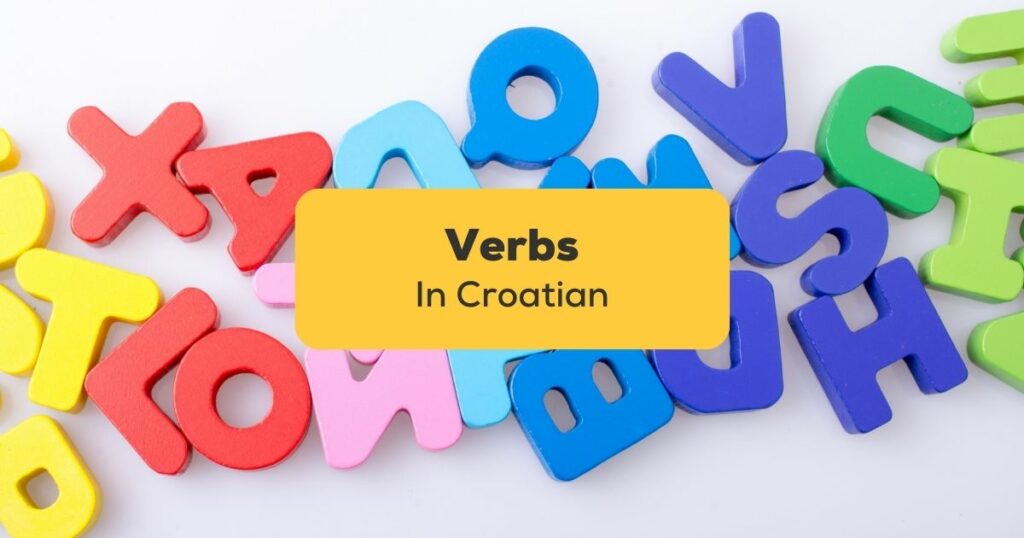Are you interested in learning more about the Croatian language, but getting stuck on Croatian verbs? They can be tricky, but with a clear explanation and plenty of example sentences, you’ll learn them real quick!
If you’re learning Croatian or planning a trip to this breathtaking country anytime soon, understanding how Croatian verbs work will be quite important for an effective conversation. In this blog post, we’ll explore how Croatian verbs work in sentences, unravel the Croatian conjugation, and provide you with examples using easy Croatian verbs. Let’s begin!
How Do Croatian Verbs Work?
Croatian verbs have a huge role in sentence construction, expressing actions, states, and daily activities. Unlike English, where the verb’s position usually remains constant, Croatian verbs exhibit a lot of flexibility. They can appear at the beginning, middle, or end of a sentence, allowing for varied emphasis and style. This fluidity makes Croatian an expressive language once you master its verb forms!
Understanding Croatian Verb Conjugation

Unlike English, where verb conjugation is relatively straightforward, Croatian verbs change their form according to the subject (I, you, he/she/it, we, they) and the tense (past, present, and future tense). Yikes, that seems like a lot to remember! But don’t worry, once you grasp the basics, you’ll be conjugating without thinking! Let’s take a look at how to conjugate Croatian verbs:
Step #1: Identify The Verb’s Infinitive Form
In Croatian, verbs end in -ati, -iti, or -eti. For example, “govoriti” (to speak), “pjevati” (to sing), and “pisati” (to write).
Step #2: Remove The Infinitive Ending
Remove the -ati, -iti, or -eti ending, and you’ll be left with the verb’s stem.
Step #3: Add The Appropriate Ending:
Attach the appropriate ending to the stem, depending on the subject, tense and mood.
Let’s take a gander at present tense conjugation!
Let’s start with the present forms, which is used to describe actions happening in the present.
Here’s a chart illustrating the present tense endings for various forms of Croatian verbs, depending on the subject:
| Subject | Verb (to speak – “govoriti”) | Verb (to sing – “pjevati”) | Verb (to write – “pisati”) |
| Ja (I) | govorim | pjevam | pišem |
| Ti (You) | govoriš | pjevaš | pišeš |
| On/Ona/Ono (He/She/It) | govori | pjeva | piše |
| Mi (We) | govorimo | pjevamo | pišemo |
| Vi (You – plural/formal) | govorite | pjevate | pišete |
| Oni/One/Ona (They) | govore | pjevaju | pišu |
The chart above represents the conjugation patterns for regular verbs ending in -ati, -iti, or -eti. Irregular verbs may have different endings, so remember that!
Remember, practice is key to mastering Croatian verb conjugation! Are you getting it now?
Top 30 Most Useful Croatian Verbs

Let’s check out the top 30 best Croatian verbs to learn as a beginner.
| English | Croatian |
| to be | biti |
| to have | imati |
| to do | raditi |
| to go | ići |
| to see | vidjeti |
| to want | htjeti |
| to eat | jesti |
| to drink | piti |
| to speak | govoriti |
| to understand | razumjeti |
| to love | voljeti |
| to like | sviđati se |
| to sleep | spavati |
| to wake up | probuditi se |
| to work | raditi |
| to study | učiti |
| to play | igrati |
| to listen | slušati |
| to read | čitati |
| to write | pisati |
| to watch | gledati |
| to travel | putovati |
| to meet | sresti se |
| to call | nazvati |
| to visit | posjetiti |
| to learn | naučiti |
| to ask | pitati |
| to answer | odgovoriti |
| to wait | čekati |
| to forget | zaboraviti |
| to remember | sjetiti se |
These common Croatian verbs will help you build a solid foundation for expressing yourself in the Croatian language!
Want more tools to help you with Croatian grammar and communication skills? Check out Croatian prepositions & Croatian adverbs.
Example Sentences Using Croatian Verbs

Now that we have a grasp of conjugation and some example verbs, let’s put these verbs into action with 11 sample sentences. Remember, practice makes perfect, especially with language learning!
Sentence #1: “Ja govorim hrvatski.” (I speak Croatian.)
Sentence #2: “Ti pjevaš lijepo.” (You sing beautifully.)
Sentence #3: “Ona piše pisma.” (She writes letters.)
Sentence #4: “Mi čitamo knjige.” (We read books.)
Sentence #5: “Vi jedete ukusnu hranu.” (You eat delicious food.)
Sentence #6: “Oni igraju nogomet.” (They play soccer.)
Sentence #7: “Gledam televiziju svaki večer.” (I watch television every evening.)
Sentence #8: “Hoćeš li mi pomoći s ovim zadatkom?” (Will you help me with this task?)
Sentence #9: “Ona vozi bicikl u parku.” (She rides a bike in the park.)
Sentence #10: “Mi putujemo na more sljedeći tjedan.” (We are traveling to the seaside next week.)
Sentence #11: “Djeca se igraju u dvorištu.” (The children are playing in the yard.)
Remember, the more you practice using Croatian verbs in sentences, the more natural and fluent you’ll become. Keep exploring and expanding your vocabulary, and you’ll soon be able to express yourself confidently in Croatian! Don’t you want to have a real life conversation with a Croatian local?
To Conclude
In conclusion, Croatian verbs may initially seem daunting with their many conjugation patterns, but with practice and perseverance, you can conquer them to be one step closer to fluency in Croatian.
By understanding how Croatian verbs work in a sentence and diligently practicing their conjugations, you’ll gain the confidence to express yourself accurately and engage in meaningful conversations with locals. So, grab Ling, your favorite language learning app, and dive into verb conjugation exercises. Sretno (Good luck) on your language learning journey!
Want to learn more of the Croatian language, especially Croatian grammar? Download the free Ling App today from the App Store and Play Store. It is a highly researched language-learning app, specializing in niche languages (like Slavic languages), that make for a fun and personalized experience.
With Ling, you’ll smash your Croatian language goals with a little hard work and practice. Aside from Croatian, there are over 60+ foreign languages to learn on Ling. Download it today!



































































